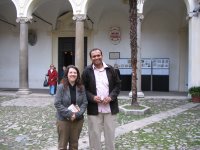From the book of Lenten meditations written by me:
The Power of the Cross: Applying the Passion of Christ to Your Life
Michael Dubruiel's first blog.
I walked out of my apartment building this morning and noticed that an announcement was posted on the main door. I stared at it for a minute, trying to translate whether the building would be without hot water or have a temporary power outage.
None of that -- it was naming the date that a Catholic priest would be in the building to bless each residence with holy water for Easter. As I looked up and down the street, I saw that every door had the same sign posted. This caught me by surprise - I only know of priests coming to bless houses in exorcism horror movies!
Apparently, this is a ritual that was traditionally done on the eve of Easter. Homes are blessed by the parish priest in memory of the angel who signed door-posts with lamb's blood in Egypt. Although Easter is a ways away, I suppose Rome is just too big for the priests to hit every house the day before Easter.

How do you think the Church should proceed towards this end?
Evangelization is the main challenge for the Church in Asia. But evangelization must have a new expression, adapted to the needs of this continent, while keeping to the same message: the word of Christ. I think we should follow the path of so-called “integral evangelization” indicated by Paul VI, sensitive to people’s problems and to faith inculturation, with the aim of freeing men and women from slavery: of vices, sins, and corruption. And this is especially evident and necessary in the Philippines.
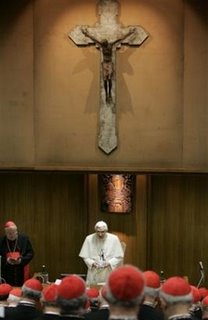 From Yahoo News:
From Yahoo News:Benedict's No. 2, Cardinal Angelo Sodano, opened the meeting by thanking the pope for seeking the advice of the cardinals, saying it "shows us the importance your Holiness places on the votes of our college."
The daylong session came on the eve of Benedict's first ceremony to elevate 15 prelates to the top tier of the Catholic hierarchy — additions the pope has said reflect the global reach of the church.
The agenda of Thursday's meeting appeared to be fairly open. Cardinals have said they expect the discussion to include relations with Islam and the Orthodox Church, international terrorism and the reform of the Vatican hierarchy.
"From a historical perspective," the communique reads, "the ancient Patriarchates of the East, defined by the Councils of Constantinople (381) and of Chalcedon (451), covered a fairly clearly demarcated territory. At the same time, the territory of the see of the Bishop of Rome remained somewhat vague. In the East, under the ecclesiastical imperial system of Justinian (527-565), alongside the four Eastern Patriarchates (Constantinople, Alexandria, Antioch and Jerusalem), the Pope was included as the Patriarch of the West. Rome, on the other hand, favored the idea of the three Petrine episcopal sees: Rome, Alexandria and Antioch. Without using the title 'Patriarch of the West,' the Fourth Council of Constantinople (869-870), the Fourth Lateran Council (1215) and the Council of Florence (1439), listed the Pope as the first of the then five Patriarchs.
"The title 'Patriarch of the West' was adopted in the year 642 by Pope Theodore. Thereafter it appeared only occasionally and did not have a clear meaning. It flourished in the sixteenth and seventeenth centuries, in the context of a general increase in the Pope's titles, and appeared for the first time in the 'Annuario Pontificio' in 1863."
The term 'West' currently refers to a cultural context not limited only to Western Europe but including North America, Australia and New Zealand, thus differentiating itself from other cultural contexts, says the communique. "If we wished to give the term 'West' a meaning applicable to ecclesiastical juridical language, it could be understood only in reference to the Latin Church." In this way, the title "Patriarch of the West," would describe the Bishop of Rome's special relationship with the Latin Church, and his special jurisdiction over her.
"The title 'Patriarch of the West,' never very clear, over history has become obsolete and practically unusable. It seems pointless, then, to insist on maintaining it. Even more so now that the Catholic Church, with Vatican Council II, has found, in the form of episcopal conferences and their international meetings, the canonical structure best suited to the needs of the Latin Church today."
The communique concludes: "Abandoning the title of 'Patriarch of the West' clearly does not alter in any way the recognition of the ancient patriarchal Churches, so solemnly declared by Vatican Council II. ... The renouncement of this title aims to express a historical and theological reality, and at the same time, ... could prove useful to ecumenical dialogue."
In the days of the Taliban, those promoting Christianity in Afghanistan could be arrested and those converting from Islam could be tortured and publicly executed.
That was supposed to change after U.S.-led forces ousted the oppressive, fundamentalist regime, but the case of 41-year-old Abdul Rahman has many Western nations wondering if Afghanistan is regressing.
Rahman, a father of two, was arrested last week and is now awaiting trial for rejecting Islam. He told local police, whom he approached on an unrelated matter, that he had converted to Christianity. Reports say he was carrying a Bible at the time.
A monk may have leapt to his death from a monastery after reading The Da Vinci Code, it emerged yesterday.
Abbot Alan Rees, 64, a revered figure in the Benedictine community, fell 30ft from a second-storey balcony at Belmont Abbey in Herefordshire last October.
The Swansea-born monk had suffered from depression for the past 12 years.
In our catechesis on Christ and the Church, we have seen how the Church is built “on the foundation of the Apostles”. The Gospels show how Jesus, at the beginning of his public ministry, chose the Twelve to become “fishers of men”. Saint John in particular presents the calling of the Apostles as the fruit of a life-changing, personal encounter with the Lord. More than just the proclamation of a message, the preaching of the Gospel is seen as a witness to the person of Jesus Christ and an invitation to enter into communion with him. Jesus sent his Apostles first to the “lost sheep of the house of Israel”. This prophetic act should be understood in the light of Israel’s messianic expectation, according to which God, through his Chosen One, would gather his people like a shepherd his flock. This “gathering” is the sign of the coming of God’s Kingdom and the extension of his saving power to every nation and people. After the Resurrection, the universality of the mission entrusted to the Apostles would become explicit. The Risen Lord would send them forth to make disciples of every nation, even “to the ends of the earth”!
Everyone who knows about St. Rita and her devotion to Christ, please ask her to pray for my daughter. Thank you. Mar
 It was raining hard enough that I ran back up the stairs of the apartment to get an umbrella the final morning in Rome. Then I made my way to St. Peter's that now seemed almost like an old habit. A few nuns, also with umbrellas were in line with me. We made our way into St. Peter's. First, I made my way to the tomb of St. Gregory Nazianzen and in doing so found one of the kneelers where the conditions for receiving a plenary indulgence were listed--confession was one of the conditions, so I found an confessor who could hear confessions in English and made mine, then went back to the kneeler and said prayers for the intention of the Holy Father. Then I attended a Mass in Italian at the tomb of Blessed John XXIII. Then a visit to the tomb of Pope John Paul II where I prayed the Joyful mysteries of the rosary. Then to the Blessed Sacrament chapel to pray Morning Prayer. Then a rush out of St. Peter's and back to the apartment. When I got back there, the cab driver was already there (although it was about fifteen minutes before we had told him)...more rush to finish taking trash to a dumpster two blocks away, and then to bring the baggage down and take a final look around. Then through the streets and out of Rome through fogged up windows. That was two weeks ago today, but seems like a distant dream already.
It was raining hard enough that I ran back up the stairs of the apartment to get an umbrella the final morning in Rome. Then I made my way to St. Peter's that now seemed almost like an old habit. A few nuns, also with umbrellas were in line with me. We made our way into St. Peter's. First, I made my way to the tomb of St. Gregory Nazianzen and in doing so found one of the kneelers where the conditions for receiving a plenary indulgence were listed--confession was one of the conditions, so I found an confessor who could hear confessions in English and made mine, then went back to the kneeler and said prayers for the intention of the Holy Father. Then I attended a Mass in Italian at the tomb of Blessed John XXIII. Then a visit to the tomb of Pope John Paul II where I prayed the Joyful mysteries of the rosary. Then to the Blessed Sacrament chapel to pray Morning Prayer. Then a rush out of St. Peter's and back to the apartment. When I got back there, the cab driver was already there (although it was about fifteen minutes before we had told him)...more rush to finish taking trash to a dumpster two blocks away, and then to bring the baggage down and take a final look around. Then through the streets and out of Rome through fogged up windows. That was two weeks ago today, but seems like a distant dream already. On Sunday morning, I made my way to Saint Peter's not to attend Mass (we would do that later as a family), but to visit the various tombs of the Saints, Blesseds and soon to be (think Pope John Paul II), praying the Office at the various altars and then the rosary. It is interesting to me that yesterday morning I awoke in the middle fo the night and watched a live Mass from the St. Peter's and it looked so different to me that at first I thought the Pope was at some other church (this is just the opposite of what I expected would be the case from here on), but I think when you only see a small image of something that is so massive it has that effect.
On Sunday morning, I made my way to Saint Peter's not to attend Mass (we would do that later as a family), but to visit the various tombs of the Saints, Blesseds and soon to be (think Pope John Paul II), praying the Office at the various altars and then the rosary. It is interesting to me that yesterday morning I awoke in the middle fo the night and watched a live Mass from the St. Peter's and it looked so different to me that at first I thought the Pope was at some other church (this is just the opposite of what I expected would be the case from here on), but I think when you only see a small image of something that is so massive it has that effect.

 the Sunday Angelus (our second on this trip). The wind was blowing the banner hanging from the Pope's study pretty steadily.
the Sunday Angelus (our second on this trip). The wind was blowing the banner hanging from the Pope's study pretty steadily.To all the English-speaking pilgrims and visitors I extend a warm welcome. In a special way I greet the students from Trondheim Katedralskole in Norway and those from Duquesne University in the United States. As we begin this holy season of Lent, I pray that Almighty God will continue to bless the members of your communities with a vigorous faith and a generous spirit. Upon all of you, I invoke the abundant Blessings of Almighty God.
I wish you all a good Sunday and a good Lent!
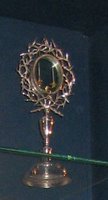
Two thorns from the crown of thorns. The plant they come from has not been identified. They agree with other thorn relics.

The 'Titulus', part of the Title of the Cross bearing the words "Jesus of Nazareth, King...". It was found on 1 February 1492, built into the wall of the basilica behind a mosaic that was being repaired. The brick which covered it was inscribed 'TITULUS CRUCIS' - it can be seen in the outer relic chapel, together with a reconstruction of the whole Title. The relic was unknown at the time, but there are sources indicating that such a relic was venerated in the courtyard on Calvary in Jerusalem. The pilgim Aetheria (c. 385) mentions this, as does the pilgrim Antonius of Piacenza two centuries later. St Helena is said to have divided the relic into three parts, giving one to Constantine, keeping one in Jerusalem and sending the last to Rome. The relic was allegedly hidden in the wall c. 455, when the clergy needed to protect it from the attacking Visigoths. It is unknown why it was left there, and forgotten, until 1492, but it might simply be because the cleric responsible for hiding it was killed or displaced during the sack of the city. The workmen found a lead coffer sealed by Cardinal Gerardus, later Pope Lucius II. It is said to have been in quite good condition at the time, but Bosio wrote 60 or 70 years later that the red paint on the letters had faded and that worms had eaten away the words 'Jesus' and 'Judaeorum'. The words are cut from the right to the left, leading some scholars to believe they were cut by a Hebrew used to writing in that direction. It does seem unlikely that a medieval forger would do such a thing.

Splinters of the True Cross.
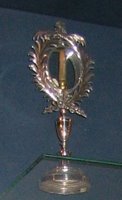 The finger of St. Thomas (the Churches in Rome site doesn't mention this but Father Michael did, saying that it was the index finger of St. Thomas that would have touched the wounds of Christ).
The finger of St. Thomas (the Churches in Rome site doesn't mention this but Father Michael did, saying that it was the index finger of St. Thomas that would have touched the wounds of Christ).
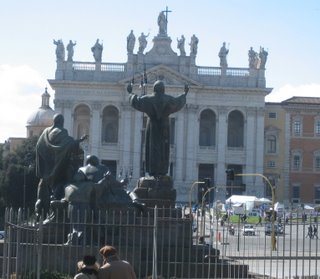
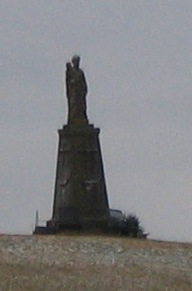 From the Office of Readings:
From the Office of Readings: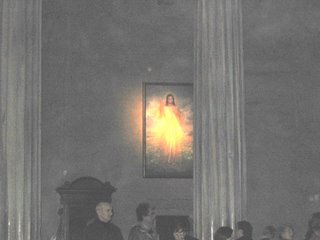
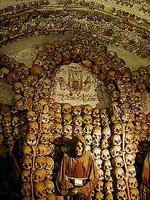 The first stop was the Capuchin Crypt in the Church of Santa Maria della Concezione de Cappuccini. A rather macabre collection of the bones of friars arranged in various postures to, well attract tourists and deliver a message read in the last of the five or six rooms, "where you are, we once were, where we are you, you soon will be." After our visit here, we did walk into the Church above. The body of St Felix of Cantalice lies under one of the altars and it didn't strike me at the time, but does now this is the very St. Felix for which St. Felix Friary in Huntington, IN was named after. This Friary is where a very young Albert Groeschel came and received the name Benedict (after Benedict Joseph Labre) and as a novice witnessed the ecstasy of one Venerable Solanus Casey. The Friary was sold some years ago, but the building remains and I often walk its grounds. This past December I was blessed to take Father Groeschel back to the friary of his novice year and to walk the halls and hear fantastic stories of what he witnessed while there. Today I prayed at the tomb of the St. Felix!
The first stop was the Capuchin Crypt in the Church of Santa Maria della Concezione de Cappuccini. A rather macabre collection of the bones of friars arranged in various postures to, well attract tourists and deliver a message read in the last of the five or six rooms, "where you are, we once were, where we are you, you soon will be." After our visit here, we did walk into the Church above. The body of St Felix of Cantalice lies under one of the altars and it didn't strike me at the time, but does now this is the very St. Felix for which St. Felix Friary in Huntington, IN was named after. This Friary is where a very young Albert Groeschel came and received the name Benedict (after Benedict Joseph Labre) and as a novice witnessed the ecstasy of one Venerable Solanus Casey. The Friary was sold some years ago, but the building remains and I often walk its grounds. This past December I was blessed to take Father Groeschel back to the friary of his novice year and to walk the halls and hear fantastic stories of what he witnessed while there. Today I prayed at the tomb of the St. Felix!

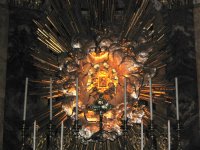

 I think we missed out on some good stuff in this church, but as I learned too late there really isn't a good tour book when it comes to churches. The links that I've provided throughout this commentary would have been invaluable in book form (now there is a thought(and I probably should go back and check the accuracy).
I think we missed out on some good stuff in this church, but as I learned too late there really isn't a good tour book when it comes to churches. The links that I've provided throughout this commentary would have been invaluable in book form (now there is a thought(and I probably should go back and check the accuracy).
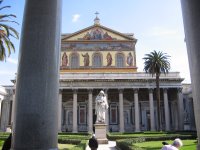

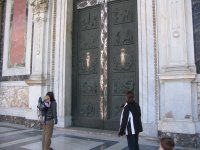

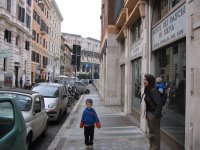

For I remember that, in my Homilies upon the Gospel, I told how in that porch which is in the way to St. Clement's Church, there lay a certain man called Servulus, whom I doubt not but you also do remember: who, as he was poor in wealth, so rich in merits. This man had long been afflicted with sickness: for from the first time that I knew him, to the very last hour of his life, never can I remember but that he was sick of the palsy, and that |195 so pitifully, that he could not stand, nor sit up in his bed: neither was he ever able to put his hand unto his mouth, or to turn from one side to the other. His mother and brethren did serve and attend him, and what he got in alms, that by their hands he bestowed upon other poor people. Read he could not, yet did he buy the holy scriptures, which very carefully he caused such religious men as he entertained to read unto him: by means whereof, according to his capacity, though, as I said, he knew not a letter of the book, yet did he fully learn the holy scripture. Very careful he was in his sickness always to give God thanks, and day and night to praise his holy name.
When the time was come, in which God determined to reward this his great patience: the pain of his body strook inwardly to his heart, which he feeling, and knowing as his last hour was not far off, called for all such strangers as lodged in his house, desiring them to sing hymns with him, for his last farewell and departure out of this life: and as he was himself singing with them, all on a sudden he cried out aloud, and bad them be silent, saying: "Do ye not hear the great and wonderful music which is in heaven?" and so whiles he lay giving of ear within himself to that divine harmony, his holy soul departed this mortal life: at which time, all that were there present felt a most pleasant and fragrant smell, whereby they perceived how true it was that Servulus said. A monk of mine, who yet liveth, was then present, and with many tears useth to tell us, that the sweetness of that smell never went away, but that they felt it continually until the time of his burial.
